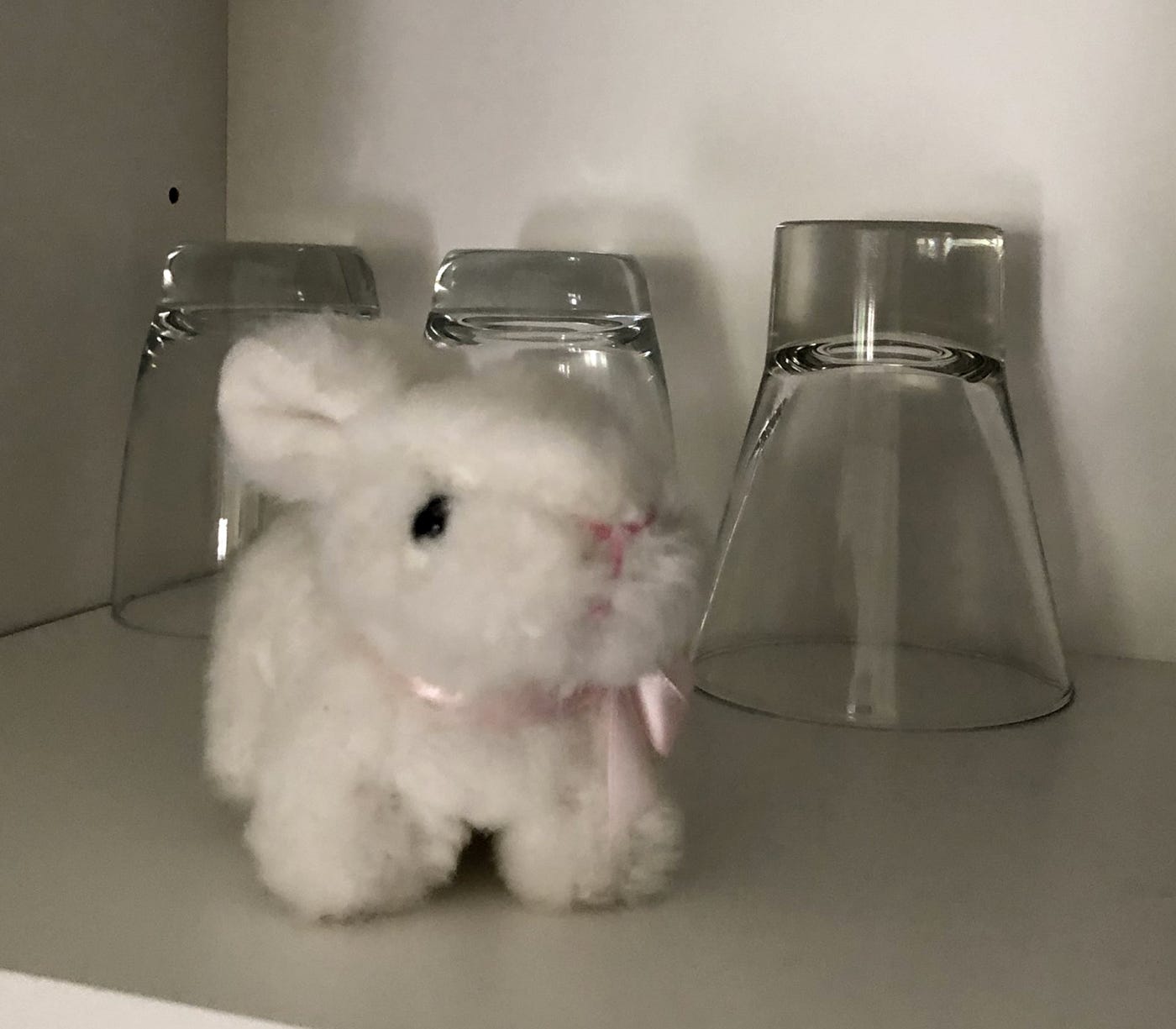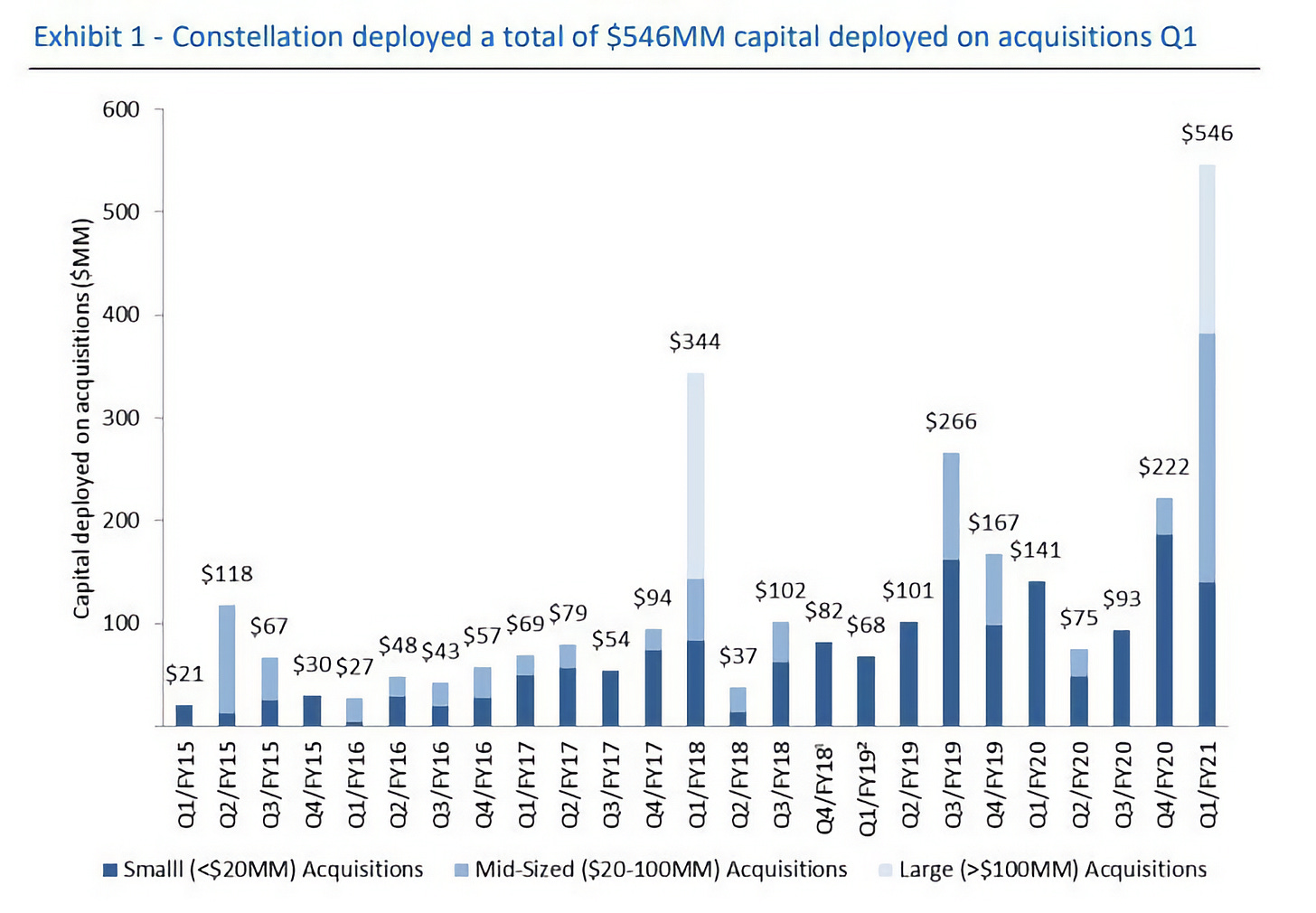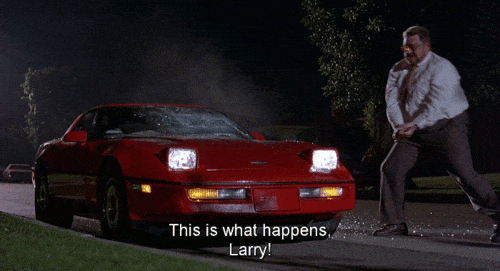113: Focus is not a Habit, Constellation Software Q1 M&A, Google vs Oracle, the Bus Factor, E-Comm, Immensity of Time, Neuroprotection of Ketosis, CDC, and Ask Me Anything
"the martial culture of ancient Sparta"
I really do think that the ability to sustain concentration on cognitively demanding tasks is really the super-power of the 21st century.
It’s the uber-skill on which almost everything else that is valuable in our economy can build. We should 100% be training for this.
I think the ability to concentrate in 21st century American culture is like what physical fitness or sword-fighting ability was in the martial culture of ancient Sparta.
It’s something you would want to inculcate in everyone.
It is what horse-riding and arrow-shooting was to 18th century Comanche culture. [...]
Focus is not a habit.
It’s not something you know how to do but you should probably just do it more often, like flossing your teeth. Instead, it’s a skill that you get better at with practice.
—Cal Newport, podcast episode 6, at 55:30 mins in (this link goes to that timestamp).
(considering that most of the people reading this probably put food on the table based on the quality of their thinking and decision-making, how we train and maintain our ability to focus and think clearly for long stretches isn’t something to take lightly and leave up to chance — wax on, wax off)
🐳 I was thinking about how a blue whale has evolved from single-cell ancestors, and the immensity of time required for that to happen.
As amazing is the fact that this line of ancestors from the blue whale — or you and I — to that very first spark of self-replicating life on earth needs to be completely unbroken.
Every one of these individuals had to live long enough, and survive against all odds (being eaten by a predator, falling to an accidental death, perishing from disease, lightning strikes, etc), at least until they had reproduced.
If you think hard enough about how much time that all took, it’s a bit vertigo-inducing.
We humans think of a few thousand years as a really long time, but try to really feel how small that is compared to millions, or hundreds of millions, or billions of years.
So in your mind’s eye, zoom out and look at our planet as seen from space. Then imagine an accelerated time-lapse of a hundred million years in hyper-fast-forward.
You’d see continents move like they’re floating on water, and if you had the eyes of a hawk — or a spy satellite — and could zoom in on any part of the planet, you’d see all kinds of life cover everything like moss on a rock, and species roam, take over ecosystems, new predators emerge, body shapes rapidly evolving to better fit the environment…
What a crazy planet we’re living on.
All this immensity of time took place on a relatively small surface area. This means that anywhere you are today, anywhere you take walks or drive over in your car, countless amazing things have happened. Volcanoes have erupted, dinosaurs have had epic battles for survival, to eat or avoid being eaten.
There’s no doubt been many first kisses and tragic murders a stone’s throw away from where you rest your head at night.
What a crazy world 🌍
😐 I’m trying to be more bored lately. I'm not very good at it, partly because I don't have enough free time to do anywhere close to everything I want to do, so it's easy to always have something to fill any downtime.
But I've started to think of “no input” time as "processing time", and that makes it easier to seek out rather than try to avoid.
We can't constantly have stimulus.
Sometimes we need to be bored a bit, both to get used to the hard task of focusing on a single thing without jumping to pleasant distractions as soon as the going gets hard, but also to have space for your own thoughts, and to process what we’ve learned and/or need to find answers to.
It’s probably why every time I'm peeling potatoes or taking a shower I have plenty of ideas.
Update: I actively worked on this. Usually when I take walks in the woods, I listen to podcasts, but yesterday I didn’t.
I could really see the difference. I was thinking through things and processing ideas and coming up with all kinds of stuff (some of which are in my notes and will make it to future editions).
It works.
I won’t stop listening to podcasts — I get a lot from them too — but I think I’ll try to alternate more and reserve some “processing” time.
🐰 I just found a plush bunny in my kids’ toys, and it reminded me of something I did last summer. Here’s what I wrote at the time:
A few months ago, as a joke, I hid a stuffed bunny in my wife’s things, just to make her smile when she found it. She then hid it back in my things... and we’ve been doing it back and forth ever since. Every couple days, I find it, and it does make me smile!
Gotta start doing that again, it was a fun game…
🎤 I always want to try new things, so here one: I want to do an Ask Me Anything (AMA) type Q&A with you.
The way it works is simple.
If you have a question or some feedback for me, send it through the form below. I’ll pick some and respond in audio format (a podcast).
There are two kinds:
1) Questions or feedback about stuff I wrote about in the newsletter (more likely to be answered, because I have an opinion on that stuff for sure)
2) Questions about any other thing (less likely to be answered, not because I don’t want to, but because there's a lot of things I don't know about or don't have an opinion on)
Here’s where you send your question(s):
Investing & Business
Constellation Software’s Q1 M&A
Thanks to Late Cycle Investing for posting this latest RBC estimate of how much capital Constellation Software has deployed in Q1.
Impressive numbers, even if you exclude the $267m for Topicus (but you shouldn’t exclude it, because the 70% that isn’t in CSI has been spun to you and you’ve kept those shares, right?).
I also enjoyed this thread by Late Cycle showing what was said about CSI over the year:
analyst narrative since 2013 (SP then: $127): "Diminished likelihood of Positive EPS surprised" // 2014 (SP: $250): "Less attractive risk-reward" // 2015 (SP: $490): "Limited visibility to further margin expansion" also "Peak margins?"
2016 (SP: $530): "The Berkshire Hathaway of software" // 2017 (SP: $672) "Investors concerned growth would materially slow" // 2018 (SP: $900): "Acquisitions weigh on margins" // 2021 (SP: $1670) "Software company or capital allocator?"
Moral of the story? Don‘t let analyst narrative spook you out of a name with a management team as competent and determined as Marks. ROIC on larger acquisitions may be a little lower going forward, this team knows hows to compound. [...]
Are Your Investments Vulnerable to the Bus Factor?
I like this way of thinking about the key person risk:
A company dependent on a single person’s work has a single point of failure. In tech jargon, they have low Bus Factor, the number of people who would have to get hit by a bus for the project to fail. The higher your Bus Factor, the greater your institutional resilience. (Source)
I found this via Byrne Hobart (yeah, I know), in one of his free posts from February:
The most successful companies are often synonymous with their founders, but that hides an important problem: a company is, in principle, immortal, but human beings, for the foreseeable future, entirely mortal. If a founder wants to build a truly important institution, it needs to achieve a bus factor greater than one. [...]
Which means that for the most interesting companies, success is not just a matter of a good founding, but of periodic refounding. [...]
Refounding events at companies are a way to fight back against premature optimization. Whenever a company rides up a promising S-curve, it's because that company excels at solving a particular category of problem. Once that problem has been solved, the company's remaining problems are different. Sometimes, an organization can refocus without completely changing itself, but often it needs a more revolutionary approach. Refoundings don't necessarily require a new CEO, although they're often associated with it. They do generally need a painful catalyst, though. [...]
Companies are legally immortal, but they're not immortal like vampires, more like the Turritopsis dohrnii that periodically ages in reverse and begins its lifecycle again.
E-commerce Gains in 2020
A few hundred billions here, a few hundred billions there, and pretty soon you’re talking real money!
Consumers across the globe spent $900 billion more at online retailers in 2020 compared with the prior two-year trend, according to a report released Tuesday by the Mastercard Economics Institute. (Source)
Ok, which one of you has been trading a lot lately?
The Q1 stats from Intercontinental Exchange are out:
1Q21 highlights include:
Total average daily volume up 30% vs. 4Q20
Energy ADV up 25% vs. 4Q20
Brent ADV up 40% vs. 4Q20
TTF gas ADV up 31% vs. 4Q20 including record TTF futures ADV
Environmentals OI up 5% y/y
Ags and metals ADV up 24% vs. 4Q20
Sugar ADV up 44% vs. 4Q20
Interest rate ADV up 47% vs. 4Q20
Sterling ADV up 51% vs. 4Q20; OI up 60% y/y including record OI of 21.1 million contracts on March 11
Record Gilt ADV up 11% y/y; OI up 49% y/y
Record SONIA ADV up 627% y/y; OI up 269% y/y including record OI of 226 thousand contracts on March 9
Equity Indices ADV up 7% vs. 4Q20
MSCI ADV up 14% vs. 4Q20
U.S. Cash Equity ADV up 7% y/y
U.S. Equity Options ADV up 65% y/y
I guess that’s nothing compared to all the trading taking place on Coinbase…
When More Competition is a Good Thing™
Friend-of-the-show Shomik Ghosh writes:
when AWS released DocumentDB to compete with MongoDB. I owned MongoDB stock and my first reaction was “oh shit”.
However, as I digested the news, I realized that in all of the priorities AWS could be doing, they instead chose to devote significant resources to building a Mongo clone. [...]
If a big company with infinite resources and tons of customer feedback, thinks one of the most impactful resource allocation projects for them is to build a competing product? That’s probably a good sign.
When a competitor, especially a large company, enters into your space….it likely means the market you’re targeting is a whole heckuva lot bigger than you originally thought.
Read the whole thing, and subscribe to Shomik’s NL.
’Google will stop using Oracle’s finance software and adopt SAP instead’
The two companies increasingly compete in the cloud computing market, and Oracle’s refusal to certify its database for use in Google’s cloud hampered adoption among large companies (Source)
Science & Technology
Obi Wan: “That’s no [star]”
It's an infrared image by the Spitzer Space telescope, as wide as the full moon.
The dots aren't stars.
They're galaxies.
Each dot is 100s of Billions of stars.The image is part of the S-CANDELS programme, which observed parts of the sky very deeply (50 hours each pointing) with the Spitzer IRAC camera.
The goal was to obtain very sensitive infrared data for very distant galaxies. [...]
The faintest dots you can see are galaxies the light of which took over 13 Billion yrs to reach us. A snapshot of the Universe when it was less than a Billion years old.
The Astrophysical Journal, via Kai Noeske
‘Neuroprotection of ketosis in acute injury of the mammalian central nervous system: A meta‐analysis’
Interesting meta-study via Dom D’Agostino:
Our meta-analysis included 49 studies looking at the effects of ketosis in acute brain damage in experimental murine models. We separated the results based on age, the type of insulin (ischemic vs non-ischemic), and the site of injury (brain or spinal cord).
Our results showed that across the board ketosis significantly improved outcomes in acute brain injuries as shown by the reduction in mortality, and of neuronal damage and dysfunction. The effects were strongest in younger models, in the brain, and in response to ischemic insult. That said, the effects on adults were still remarkable!
We found that the only predictor of the protective effect of ketones was the level of blood ketones, independent of how ketosis was induced (fasting, ketogenic diets, or exogenous ketones) or when ketosis was initiated (before or alongside the insult). Together suggesting that ketones are the variable responsible for neuroprotection and that the greater the ketone availability (higher blood ketone levels within the physiological range) the greater the therapeutic potential.
The clinical relevance of these findings is that ketogenic treatments may offer protection against brain damage induced by brain injuries, for example, traumatic brain injury (TBI), which has been referred to as a “silent epidemic” due to extremely high prevalence.
While more science is needed on this, if I ever get a TBI, I’ll probably be hitting the exogenous ketones or doing a longer fast ASAP, just in case. Seems like there’s little downside and potential huge upside.
There’s a great podcast by Peter Attia with Dom that I highly recommend (covering a variety of topics):
CDC on Surface Transmission (aka Let’s stop the hygiene theater)
I wrote about how it’s taking us too long to update to the latest data on SARS-CoV-2, and there’s been a lot of wasted effort, resource, and mindshare going to mostly pointless hygiene theater when this same effort and public messaging could’ve gone into ventilation, masks, meeting outdoors, air purifiers, etc.
There are real costs to putting emphasis on something, it takes attention from something else — life is trade-offs.
Anyway, the CDC is finally coming around to making it clearer:
People can be infected with SARS-CoV-2 through contact with surfaces. However, based on available epidemiological data and studies of environmental transmission factors, surface transmission is not the main route by which SARS-CoV-2 spreads, and the risk is considered to be low.
The principal mode by which people are infected with SARS-CoV-2 is through exposure to respiratory droplets carrying infectious virus.
In most situations, cleaning surfaces using soap or detergent, and not disinfecting, is enough to reduce risk. Disinfection is recommended in indoor community settings where there has been a suspected or confirmed case of COVID-19 within the last 24 hours. The risk of fomite transmission can be reduced by wearing masks consistently and correctly, practicing hand hygiene, cleaning, and taking other measures to maintain healthy facilities. (Source)
Also interesting:
On the Lighter Side…
A professor of mine went to go hear Derrida speak once. The entire talk was about cows; everyone was flummoxed but listened carefully, and took notes about...cows. There was a short break, and when Derrida came back, he was like, “I’m told it is pronounced ‘chaos.’”
Via Phil Gentry
The Arts & History
Pavilion of the Enlightened, Bangkok, Thailand
Ancient Siam (also known as Ancient City, Thai: เมืองโบราณ, Mueang Boran) is a museum park constructed by Lek Viriyaphant and occupying over 200 acres (0.81 km2) in the shape of Thailand.
Ancient Siam is dubbed as the world's largest outdoor museum. Close to the Crocodile Farm in Samut Prakan Province, the 320-hectare "city" features 116 structures of Thailand's famous monuments and architectural attractions.
Crocodile farm 🤨









Great stuff! Enjoy it very much, fro far away Israel